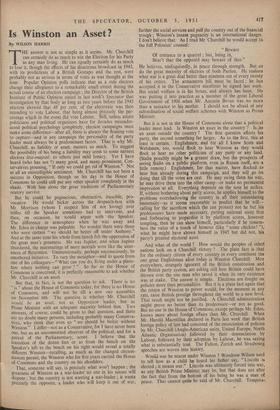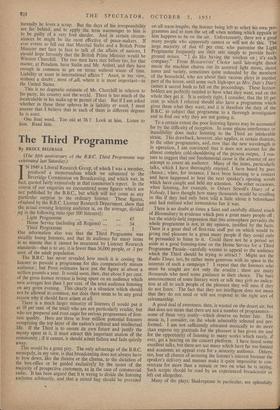Is Winston an Asset?
By WILSON HARRIS
THE answer is not as simple as it seems. Mr. Churchill can certainly do as much to win the Election for his Party • as any man living. He can equally certainly do as much to lose it, though the effects of his disastrous broadcast in 1945, with its predictions of a British Gestapo and the rest, were probably not as serious in terms of votes as was thought at the time. Popular Opinion polls indicate that as a rule electors change their allegiance to a remarkably small extent during the actual course of an election campaign ; the Director of the British Institute of Public Opinion stated in last week's Spectator that investigation by that body as long as two years before the 1945 election showed that 48 per cent. of the electorate was then intending to vote Labour, that being almost precisely the per- centage which in the event did vote Labour. Still, unless astute politicians and political organisers have for decades misunder- stood political psychology completely, election campaigns must make some difference—after all, there is always the floating vote to capture—and in any campaign the personality of the party leader must always be a predominant factor. That is why Mr. Churchill, as liability or asset, matters so much. To suggest the possibility of his being a liability may seem to some earnest electors lese-maieste, to others just mild lunacy. Yet I have heard (who has not ?) many good, and many prominent, Con- servatives groaning, "If only we could get rid of Winston." Not at all an unintelligible sentiment. Mr. Churchill has not been a success in Opposition, though on his day in the House of Commons he could still put any other speaker completely in the shade. With him alone the great traditions of Parliamentary oratory survive.
But he could be pugnacious, obstructive, irascible, pro- vocative. He would bicker across the despatch-box with Mr. Morrison (whom I suspect him of not loving) over trifles till the Speaker sometimes had to intervene, and then, on occasion, he would argue with the Speaker. The difference in atmosphere when he was away and Mr. Eden in charge was palpable. No wonder there were those who were certain "we should be better off under Anthony." And at the same time his whole front bench felt the oppression of the great man's greatness. He was Jupiter, and when Jupiter thundered, the murmurings of mere mortals were like the utter-j ances of flittermice. Unintentionally, perhaps unconsciously, he smothered initiative. To vary the metaphor—and to quote from one of his colleagues—" What can you do. living under a plane- tree where nothing can grow-? " So far as the House of Commons is concerned, it is perfectly reasonable to ask whether Mr. Churchill is an asset.
But that, in fact, is not the question to ask. There is no " is " about the House of Commons today, for there is no House of Commons. and will not be till a new one assembles on- November 6th. The question is whether Mr. Churchill would be an asset, not as Opposition leader, but as Prime Minister with an adequate majority behind him. Two answers, of course, could be given to that question, and there are no doubt many persons, including probably many Conserva- tives, who think that even so "we should be better without Winston." I differ—not as a Conservative, for I have never been one, but as an uncommitted observer of the political, and for a period of the Parliamentary, scene. I believe that the transition of the dozen feet or so from the bench on the Speaker's left to the bench on his right would reveal a totally different Winston—recalling, as much as the changed circum- stances permit, the Winston who for five years carried the House of Commons and the country on his shoulders.
That, someone will say, is precisely what won't happen ; the greatness of Winston as a war-leader no one in his senses will dispute ; but the country is not wanting a war-leader ; it wants precisely the opposite, a leader who will keep it out of war, ■ further the social services and pull the country out of the financial trough ; Winston's innate pugnacity is an international danger. I don't believe that. As I read Mr. Churchill he would accept to the full Polonius' counsel: "Beware Of entrance to a quarrel ; but, being in, Bear't that the opposed may beware of thee."
He believes, undisguisedly, in peace through strength. But so do the great majority of electors of both Parties. He realises what war is a great deal better than nineteen out of every twenty of his critics. The armaments bill must be faced ; he has accepted it in the Conservative manifesto he signed last week. But social welfare is in his bones, and always has been. He was putting it into practice as a member of the great Liberal Government of 1906 when Mr. Aneurin Bevan was no more than a nuisance to his mother. I should not be afraid of any subordination of social welfare schemes with Winston as Prime Minister.
But it is not in the House of Commons .alone that a political leader must lead. Is Winston an asset in the country ? Is.,he an asset outside the country ? The first question affects his party, the second something far larger. As to the first, this at least is certain. Englishmen, and for all I know Scots and Welshmen, too, would flock to hear Winston as they would flock to hear no other politician of any party or any land. (Stalin possibly might be a greater draw, but the prospects of seeing Stalin on a public platform, even in Russia itself, are a little remote.) Englishmen, for that matter, have flocked to hear him already during this campaign, and they will go on doing that till the votes are cast. He may swing them his way, he may drive them into the other camp—or make no permanent impression at all. Everything depends on the note he strikes. If, without bothering about party scores, he applies himself to the problems overshadowing the country in all their intimidating immensity—as it seems reasonable to predict that he will— calling for the sacrifices which (he can protest) not he but his predecessors have made necessary, putting national unity first and forbearing to jeopardise it by platform scores, however tempting, then he can show himself, particularly if he remem- bers the value of a touch of humour (like "some chicken! "),I what he might have shown himself in 1945 but did not, his party's greatest electoral asset. • , And what of the world ? How would the peoples of othetj nations look on a Churchill victory ? The plain fact is that for the ordinary citizen of every country in every continent the one great Englishman alive today is Winston Churchill. Men everywhere, strangely ignorant of the British constitution and the British party system, are asking still how Britain could have thrown over the one man who saved it when its very existence, was at stake. The answer is simple. Elections are fought on policies more than personalities. But it is a plain fact again that the return of Winston to power would, for the moment at any rate, raise British prestige throughout the world to a new level. That result might not be justified. A Churchill administration might prove no better than its predecessor—or not as good. But no one in the House of Commons, except perhaps Mr. Eden. knows more about foreign affairs than Mr. Churchill. When Mr. Harold Macmillan declared in Paris last week that British foreign policy of late had consisted of the enunciation of policies by Mr. Churchill (Anglo-American unity, United Europe, North Atlantic Organisation) followed by their denunciation by Labour, followed by their adoption by Labour, he was saying what is substantially true. The Fulton, Zurich and Strasbourg speeches are woven into history.
Would war be nearer under Winston ? Woodrow Wilson used to tell how as a child he heard his father say. "Lincoln is elected ; it means war." Lincoln was ultimately forced into war, as any British Prime Minister may be, but that does not alter the fact that from the bottom of his being he was a man of peace. That cannot quite be said of Mr. Churchill. Tempera-t baentally he loves a scrap. But the days of his irresponsibility are far behind, and to apply the term warmonger to him is to be guilty of a very foul slander. And in certain circum- stances he might be the most effective of peace-makers. If ever events so fell out that Marshal Stalin and a British Prime Minister met face to face to talk of the affairs of nations, I should hope fervently that the British Prime Minister would be Winston Churchill. The two men have met before (so, for that matter, at Potsdam, have Stalin and Mr. Attlee), and they have enough in common to get on terms without waste of time. Liability or asset in international affairs ? Asset, in my. view, without a doubt ; most of where it is most important—in the United States.
This is no dogmatic estimate of Mr. Churchill in relation to his party, his country and the world. There is too much of the incalculable in his make-up to permit of that. But if I am asked whether in those three spheres he is liability or asset. I must answer that I belieye that in each of them in different degrees be is asset. One final word. Too old at 76? Look at him. Listen to Jiirn. Read him.






















































 Previous page
Previous page